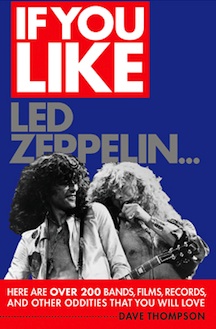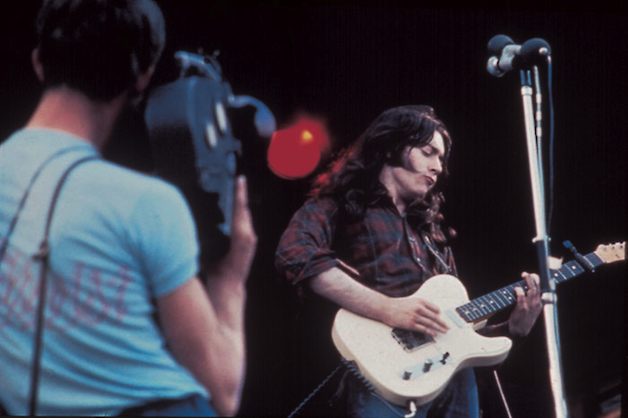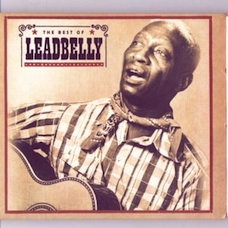Mar 19 2013
If You Like Led Zeppelin… then you’ll LOVE Rory Gallagher!

Born in Devon, England, Dave Thompson got his start writing and publishing the TV Times fanzine during the punk explosion at the end of the 1970s. A regular contributor to the weekly music paper Melody Maker throughout the 1980s, he has also written for the publications Record Collector, Rolling Stone, Mojo, Q, Spin, Alternative Press and many others. He is currently a columnist in the record collecting magazine Goldmine, and a contributor to the All Music Guide. His latest foray into the world of rock ‘n roll is “If You Like Led Zeppelin” an new addition to the “If You Like” series of books from the Hal Leonard publishing empire. “It is the unique story of how Led Zeppelin came together not as players, but as influences and ideas. It unearths the music that the musicians themselves were listening to, to open up an entire new world of experience and excitement for both casual and committed fans. It then travels beyond Led Zeppelin, to the bands and artists who in turn took their own lead from the Zep.” One of those artists discussed in the book is Rory Gallagher. Dave has kindly allowed me to post an excerpt from the book that deals with the legendary Irish axeman.
IF YOU LIKE LED ZEPPELIN… — written by Dave Thompson

… But there was a generation rising up behind and around them, too, for whom Zeppelin’s sonic and subtle influences were an open invitation to take things to a whole new level.
Blues guitarist Rory Gallagher moved to London from his native Ireland in late 1967 with Taste a band constructed firmly in the three-piece shape of the Experience and Cream. But it was Fleetwood Mac and, in particular, their guitarist Peter Green who gave Taste the confidence to follow their hearts, Gallagher later reflected — a debt he repaid shortly before his death in 1995, when he contributed a couple of tracks to the Rattlesnake Guitar Green tribute album.
“You cannot overestimate Fleetwood Mac’s importance at that time,” producer Mike Vernon agreed. “They brought the blues back into focus and rejuvenated the whole scene.” Vernon signed the infant Mac to his own Blue Horizon label, and admits it was the band’s immediate success that allowed the label to flourish as it did, becoming the primary staging ground for virtually every homegrown blues band of the era.
…And so back to Rory Gallagher, the man Jimi Hendrix once called the best guitarist in the world. Two studio albums attest to Taste’s brilliance, both released in the wake of Led Zeppelin I and both learning its lessons; Taste and On the Boards, two slabs of archetypal blues rock shot through with some astonishing detours. “some of the tracks,” affirmed Gallagher’s nephew and archivist, Daniel Gallagher, “could almost be very early metal, with that very deep, almost guttural bass. They tried to handle everything — tracks are country, the amazing jazz stuff they did on On the Boards — and that took a lot of attention away from that dark, brooding sound. It was brilliant. And if Rory had allowed ‘What’s Going On’ to be released as a single after [they played] the Isle of Wight Festival, when they were really flying, a lot could have changed.”

Rory Gallagher at the Isle of Wight ©rorygallagher.com
Instead, he broke up the band, forming a new trio for a solo debut album, Rory Gallagher, that was as strong as that third Taste LP should have been (had they only hung on to make it). Deuce (1971) was defiantly low-fi, no frills, no production — just a hard-hitting roar Danial sums up as his uncle simply asking, “‘How loud can I get this amp and how well can I play through it?’ and saying, ‘Guys, keep up’ to the band.”
The masterful Live in Europe followed. Unique in that many of its contents never appeared on a studio disc, Live in Europe was the first and, in some ways, the best of Gallagher’s many solo concert sets. “It’s such a good album and he captures the songs so well. Anybody else would have rerecorded the songs in the studio environment to show how great they are, and tried to have hits with them. But Rory realized, no, ‘this is exactly how they should sound, I nailed them,’ and he never went back to them.”

Gallagher’s only Top 10 album in the U.K., Live in Europe has too many highlights to list. But we must spare a thought for “I Could Have Had Religion,” a song Gallagher based around four anonymously written lines he’d found in a book of Irish poetry. He wrote the tune and further words, but still co-credited the song to the ubiquitous “Trad Arr.” So when Bob Dylan rang him up one day, wanting to cover the song himself and hoping for further light on its origins, the American folksinger was staggered to discover just how un-trad it really was. His own next album was intended to be an all-folk covers affair, spotlighting his own rearrangement abilities. “I can’t do that to this song,” the Zim sadly told Gallagher. “Because I can’t take it away from you.”
Gallagher was at his best. 1973’s Blueprint is arguably the repository for some of his best-known numbers: “Walk on Hot coals” (immortalized on a classic Old Grey Whistle Test performance), “Daughter of the Everglades, “Seventh Son of a Seventh Son”; Tattoo followed that same year, and then came Irish Tour ’74, the subject of both a double live album and a phenomenal concert movie of the same name.
The stars were all aligned. Gallagher was at the peak of his power and his popularity. Readers of the weekly Melody Maker had just elected him the number one guitarist in the world, and Irish Tour (both incarnations) lives up to all expectations.
In terms of rawness, the vinyl was the way to go; it captured the sound of Gallagher and band as they sounded every night, tight and turbulent, mixed with the magic of a tiny club PA and loud enough to make you sweat in your living room. The movie, shot by Tony Palmer, is a more considered affair; studio fixes and overdubs cleaned things up for what would become one of the best-loved rock flicks of the seventies.
But even here, the polish could not disguise the purity. This is still the blues at their most electrifyingly effortless, and the fact that the two releases shared just six (of nineteen) tracks ensured fans had to grab them both.

The Rolling Stones certainly did. Gallagher was the first name on their list when they were seeking a replacement for Mick Taylor, long before such better-remembered names as Jeff Beck, Wayne Perkins, and the ultimately successful candidate, Ronnie Wood. Four days were spent in Rotterdam rehearsing, before Gallagher hightailed to Japan for his own next tour. They asked him to join the band as well, but he demurred. He liked being his own boss too much. And as for him gifting them with the riff to “Start Me Up” … well, that’s the tradition in the Gallagher household, and it wouldn’t be the first time Mick and Keef played magpies with other people’s music. It took them six years to release it, of course, but it took Rory that long to record “Out on the Western Plain” — a simply devastating Leadbelly rebuild that had been around (in lyrically different form) since the Taste days, and which he now recorded for 1975’s Against the Grain.
The last truly essential Gallagher album is 1976’s Calling Card. Indeed, his nephew cites “this and Irish Tour [is] where I’d start people if they didn’t know Rory. Maybe it’s Roger Glover’s production, but it’s his most mainstream album … you’ve got the funkiness of ‘Do You Read Me,’ the great rocking tracks like ‘Moonchild,’ his voice is really good on ‘Calling Card,’ the beautiful melody of ‘Etched in Blue’…”
Gallagher would continue recording for the rest of his life, touring too and amassing a back catalog which, when remastered and reissued in 2011-2012, comprised a solid seventeen separate releases. And he was as vital on his last album, 1990’s Fresh Evidence, as he was on his first, as Daniel explained:
“The lyrics on Fresh Evidence are that kind of ‘Don’t give a …’; it’s all about having taken so many hits, dealt with so much stuff, the walking wounded … ‘Everyone’s had their chance, but I’m still here making another record.’ … ‘Kid Gloves,’ with that stuff about being asked to take a dive … It’s a very independent record, a very fierce one.”
It was also his last. Gallagher died on June 14, 1995, from complications while awaiting a liver transplant. He was forty-six.
- Dave Thompson’s book “If You Like Led Zeppelin” can be purchased online through Amazon.com
- Check out Dave Thompson’s website at: It’s Not Only Rock’n’Roll
